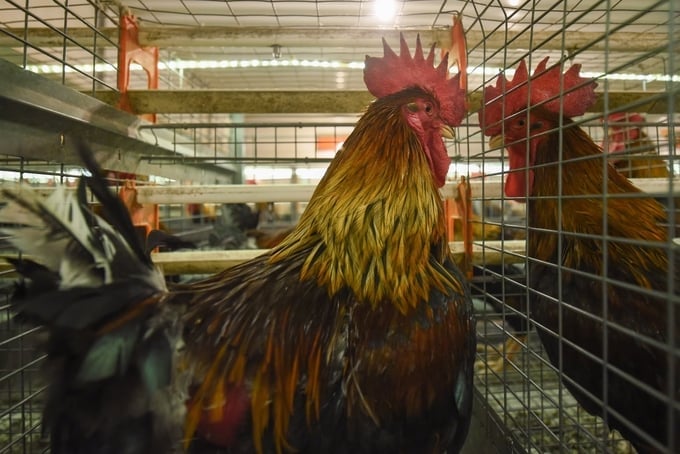June 20, 2025 | 15:21 GMT +7
June 20, 2025 | 15:21 GMT +7
Hotline: 0913.378.918
June 20, 2025 | 15:21 GMT +7
Hotline: 0913.378.918

The Ministry of Health issued multiple warnings regarding poultry, wild birds following the A/H5N1 avian influenza patient's death. Photo: Tung Dinh.
According to the General Department of Preventive Medicine under the Ministry of Health, a 21-year-old male residing in Tan Ninh hamlet, Ninh Trung commune, Ninh Hoa town, Khanh Hoa province, began experiencing symptoms of fever and cough on March 11. Despite self-treatment, the patient's symptoms did not improve.
After seeking medical attention between March 16 and March 17 at the Ninh Hoa Medical Center, the patient was transferred to Khanh Hoa General Hospital with a diagnosis of pneumonia.
Khanh Hoa province's Center for Disease Control collected samples from the patient for testing on March 19. The test results on March 20 confirmed that the patient was positive for the A/H5 avian influenza. Further testings conducted by the Pasteur Institute in Nha Trang on March 22 confirmed that the patient was positive for the H5N1 subtype. Subsequently, the patient succumbed on March 23 due to deteriorating health conditions.
Epidemiological investigations revealed that before and after the 2024 Lunar New Year, the patient engaged in wild bird trapping activities near his residential area. No poultry illness or deaths were reported in the surrounding area.
Close contacts of the patient have been identified, and their conditions are monitored daily. To date, no additional cases of avian influenza were detected.
This is the second case of A (H5N1) avian influenza recorded in Vietnam since 2014 after several years of no reported cases in humans. Prior to this, one case of A (H5N1) avian influenza in human was reported in Phu Tho in October 2022. Cumulatively, Vietnam has recorded 128 cases of A (H5N1) avian influenza since 2003, including 65 fatalities (50.8% of the total number of cases).
Globally, numerous outbreaks of avian influenza in animals have been reported since late 2023, with the predominant virus strain being A(H5N1). Additionally, Cambodia has been reporting new cases of A (H5N1) avian influenza in humans since late 2023.
According to the Department of Animal Health under the Ministry of Agriculture and Rural Development of Vietnam, sporadic outbreaks of avian influenza have been observed in poultry flocks across the country. Namely, six avian influenza outbreaks have been reported across six provinces and cities since early 2024, including Bac Ninh, Ninh Binh, Khanh Hoa, Ba Ria - Vung Tau, Long An, and Tien Giang.
Moreover, the current transitional season with unusual weather conditions promotes the development of disease pathogens. The Ministry of Health assessed that the risk of avian influenza transmission to humans will continue to be latent in the near future.
There is currently no treatment or vaccine available for avian influenza in humans. In addition, there is no evidence to suggest human-to-human transmission of the A (H5N1) avian influenza. The A (H5N1) virus is highly pathogenic, with infected individuals often experiencing rapid progression and a high mortality rate at approximately 50%.
With the aim of proactively preventing avian influenza transmission from poultry to humans, the Ministry of Health advised the public to adhere to the following measures:
- Refrain from consuming sick or deceased poultry and poultry products of unknown origin. Ensure thorough cooking and boiling of poultry products; wash hands with soap before eating.
- Avoid slaughtering, transporting, buying, or selling poultry and poultry products of unknown origin. Upon discovering sick or deceased poultry, refrain from slaughtering and consuming said poultry, and promptly report to local authorities and animal health agencies.
- Minimize contact with, or slaughtering and consumption of wild animals, particularly birds. If flu-like symptoms, such as fever, cough, chest pain, or difficulty breathing related to poultry exposure, are present, seek immediate medical attention for advice, examination, and timely treatment.
Translated by Nguyen Hai Long

(VAN) The waste of resources from agricultural by-products and the situation of counterfeit and poor quality goods in production causing losses of thousands of billions were pointed out by the National Assembly deputy.

(VAN) After 5 years of implementation, the CAI initiative has helped coffee growers change their farming practices, moving toward responsible agriculture that meets global export standards.

(VAN) The primary prerequisite for the comprehensive and robust integration of Vietnam's livestock sector into the global value chain is the establishment of a disease control system.

(VAN) The results of national programs are essential for establishing a contemporary livestock sector that is well-equipped to meet the demands of both domestic and international markets, with robust biosafety standards.

(VAN) The UNESCO Global Geopark revalidation of Non nuoc Cao Bang and the transition to a two-tier administrative model are presently undergoing a pivotal moment in Cao Bang, the northernmost province of Vietnam.
/2025/06/13/5330-2-004539_953.jpg)
(VAN) Changing policy mindset and removing investment barriers are urgent requirements to open up new development space for enterprises in the agricultural sector.

(VAN) The areas include the restoration of five million hectares of marine ecosystems.